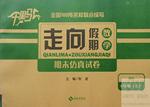题目内容
I’m Jan Hasek,1. old miner from the Czech Republic.In April 1945 I2. (hear)something explode at midnight.I got up and3. (run)outside.The sound came from a mine 4. hadn’t been used for a long time.Suddenly I saw some German soldiers5.the light of the moon.They 6. (take) wooden boxes from trucks and putting them in the mine.
A week later I decided7. (go) and see for myself.To my surprise the entrance8. the mine was closed.Some people say that the Amber Room and some gold9. (bury) in the mine.I think it might be so,as the Amber Room has never 10.(find).
练习册系列答案
 千里马走向假期期末仿真试卷寒假系列答案
千里马走向假期期末仿真试卷寒假系列答案
相关题目

